 Table
of Contents Table
of Contents
The Boy Scouts of America has published Boys'
Life since January 1, 1911. I received it for a couple years in the late 1960s while in the
Scouts. I have begun buying copies on eBay to look for useful articles. As time permits, I will be glad
to scan articles for you. All copyrights (if any) are hereby acknowledged. Here are the
Boys' Life issues I have so far.
 This edition of Boys' Life,
BTW, is the one that Ralphie Parker is shown reading in bed in the movie
A Christmas Story. This edition of Boys' Life,
BTW, is the one that Ralphie Parker is shown reading in bed in the movie
A Christmas Story. |
Nearly 80 years ago to the month, Admiral Byrd was
ensconced in his Little America quarters under the Antarctic snow cover. Byrd Antarctic Expedition II
had as its mission the documentation of weather patterns and meteor activity (which influences long
range communications) in the vast, frigid nothingness. Radio communications were essential to survival
both bodily and mentally. Little known to the outside world, or even to his encamped companions, Admiral
Byrd had nearly succumbed to noxious fumes from the electrical generator he used to power his radio.
Alone at an outpost and desperately ill, he choose to suffer silently and maintain his duties rather
than compromise the mission. One of the photos included in this January 1939 issue of Boy's Life
magazine shows the Admiral at his radio set with his hand on a telegraph key.
We Can't Get Out! - Admiral Byrd's 2nd Antarctic Expedition
The second in command of the Second Byrd Antarctic Expedition describes an epic of the ice.
About noon on August 8th, 1934, I came to the surface from my well-lighted and comparatively warm
quarters underneath the snow at Little America and stared south into the forbidding darkness and utter
desolation of the Antarctic night. I was desperately tired and my body seemed to sag under the weight
of the furs and woolens that I was wearing. A few hours previously Demas Waite, and I, had staggered
back to camp defeated in a bitter battle with the hostile elements that fashion the screeching blizzards
and hazardous trail of this frigid land.
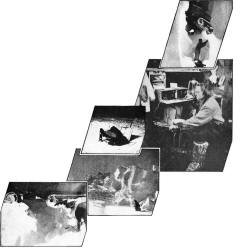 For the second time we had failed to reach Advance Base - a
tiny shack which lay buried in the snow 123 miles to the south beyond an extended area of mountainous
pressure-ice and trackless snow plains - vast level reaches laced with treacherous crevasses whose thin
roofing of snow concealed deadly traps for unwary feet. For the second time we had failed to reach Advance Base - a
tiny shack which lay buried in the snow 123 miles to the south beyond an extended area of mountainous
pressure-ice and trackless snow plains - vast level reaches laced with treacherous crevasses whose thin
roofing of snow concealed deadly traps for unwary feet.
Shortly we would be pitting ourselves once more against the might of the Antarctic, and, despite
my exhaustion, I felt a compelling urge to join the issue. In order to understand our reasons for again
venturing into this inhospitable region some knowledge of the circumstances is necessary.
Comparatively few people realize that Antarctica is in the grip of an ice age, an ice age such as
existed on the northern hemisphere probably 30,000 years ago. One of the most important items on the
program of the Byrd Antarctic Expedition II was the compiling of accurate data on its turbulent weather
conditions. For one phase of this work we established an inland weather station on the Polar plateau,
123 miles south of Little America, at which observations could be made throughout the six-months winter
night, the coldest time of the year.
Although Advance Base, as we called it, was originally planned to be a three-man station, various
unforeseen contingencies arose which thwarted our plan and forced us to make it a one-man post, which
Admiral Byrd, for reasons which he deemed sufficient under the circumstances, chose to occupy himself.
He took up his lonely vigil on March 28th, just as the winter night closed in. "So long, fellows," he
said casually as the base-laying party departed for Little America, "see you in the spring."
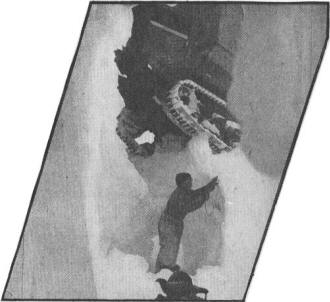 When I first conceived my plan of going to Advance Base my motives
were purely scientific. I had been making meteor observations at Little America during the night, and
due to the clarity of the upper atmosphere I had made some startling discoveries. The thought struck
me that simultaneous observations at a point further south should yield data of considerable scientific
value. Advance Base was the place. Simultaneous observations from Little America and Advance Base would
give a triangular sighting of the heavens, with a base line of 123 miles, that would be admirable for
the purpose. But how could I secure the Admiral's permission to go out there? When I first conceived my plan of going to Advance Base my motives
were purely scientific. I had been making meteor observations at Little America during the night, and
due to the clarity of the upper atmosphere I had made some startling discoveries. The thought struck
me that simultaneous observations at a point further south should yield data of considerable scientific
value. Advance Base was the place. Simultaneous observations from Little America and Advance Base would
give a triangular sighting of the heavens, with a base line of 123 miles, that would be admirable for
the purpose. But how could I secure the Admiral's permission to go out there?
Experience had taught me his great concern for the safety of his men and I knew that I would have
to put forth a very compelling reason if I hoped to win his consent to such a hazardous venture. I based
a request on the importance of the meteor observations I expected to make, and on my opinion that with
favorable weather and a few breaks in luck we had at least an even chance of getting through. With obvious
reluctance he gave his assent, qualifying it, however, with the strict provisions that "above all tractors
must be absolutely certain not to lose trail or give out of fuel" and that "no risk be taken with the
lives of men."
No.·1 tractor, the best of three machines we had at Little America was selected for the trip, and
while it was being conditioned we loaded two sleds with approximately a ton and a half each of provisions
and. gear. At 2:20 P.M., in the full of the moon on July 20th, we headed south into the Antarctic night,
lighted out of camp by a few hand-flares that shed an eerie glow on our departure. My companions were
Skinner, tractor driver, Waite, radio operator, and Flemming and Petersen. I planned to leave Flemming
and Petersen at Advance Base as observers should we be successful in making it.
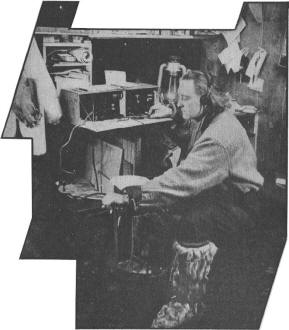 Beyond the glare of the flares navigation became difficult.
At the very start we found that the trail which had been blazed and marked with flags when Advance Base
was laid down in March, had been badly drifted with most of the flags either completely covered over
or blown to tattered shreds. Gropingly the tractor blundered slowly ahead through the blinding smother
of snow that engulfed us soon after we left the camp. Continually we lost the. trail and spent precious
time and fuel cruising about to regain it. As we proceeded the temperature dropped steadily until it
stood at 58 degrees below zero. Beyond the glare of the flares navigation became difficult.
At the very start we found that the trail which had been blazed and marked with flags when Advance Base
was laid down in March, had been badly drifted with most of the flags either completely covered over
or blown to tattered shreds. Gropingly the tractor blundered slowly ahead through the blinding smother
of snow that engulfed us soon after we left the camp. Continually we lost the. trail and spent precious
time and fuel cruising about to regain it. As we proceeded the temperature dropped steadily until it
stood at 58 degrees below zero.
Admiral Byrd at the radio key in his lonely little shack after the rescue. At left the "door" to
the quarters, the cabin completely buried below. The other pictures show some of the ice conditions
met by Dr. Poulter's party on their tortuous drive to Advance Base.
By midnight we had made good 17 miles, although we had actually covered more than 50 miles in our
blind progress and camped for a short rest. In a few hours we were moving again into conditions that
became progressively worse. Lurching along the tractor felt its way forward foot by foot. Petersen and
I spelled each other astride the hood fanning the snow with a search-light and directing Skinner to
the easiest going. The heat of the engine was of small comfort as the thermometer had slid down to 75
degrees below zero and the chill struck to our very marrow. At this extremely low temperature our furs
froze to the hardness of armor and the funnel-shaped sheepskin masks which we wore to protect our faces
constantly clogged with ice from the breath which froze as quickly as it was exhaled. All .of us were
suffering severely from exposure, but we had. embarked on a mission from which we were not lightly to
be turned aside.
By 6:30 P.M. on the 22nd we had struggled through 54 miles to the northern edge of the Valley of
Crevasses, a wide depression slashed with a crazy pattern of chasms of varying widths and depths. If
we had had daylight we probably could have made an attempt to thread our way through the maze of pits
that lay before us, but in the darkness of the night it would have been utter folly.
We couldn't get through them, and we couldn't get around them, as. we had no effective navigational
instruments or aids that would enable us to lay out a route. Even the friendly light of the stars was
denied us as the sky was thickly overcast. Confronted by this dilemma I reluctantly gave the order to
return to the base where I hoped to devise some method of navigation that would permit us to chart and
hold a course.
Two hours along the homeward trail the fury of the Antarctic was loosed upon us in a screeching blizzard.
It struck with the suddenness and fierceness of a wild animal making a kill. Breath and visibility were
cut off simultaneously. Shot by the irresistible force of the gale the powder-like snow drove through
every crack and crevice of the tractor and, accumulating under the hood, it soon choked the carburetor
and stalled the engine.
Stiff and numb from biting cold that tore at us with relentless savagery, we crawled into our sleeping-bags
to await the end of the blow. The shrieking and buffeting of the wind tormented us cruelly at first,
but our exhaustion was so great that we all went to sleep eventually. Twenty-six hours later, the storm
having abated, we dug the tractor and sleds out of the six-foot drifts in which they were buried and
limped dejectedly back to camp. We reached Little America about 8:30 P.M. on the 23rd.
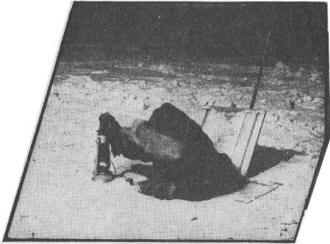 A few hours rest put us in shape to tackle the problem of navigation
which we had to solve before making another try. We hit upon the plan of using a geologist's sensitive
compass which we could line up with range lights fashioned by building snow beacons about four feet
high and putting a lighted candle in a chamber hollowed out at the top of the beacon. Facing the chamber
with a thin sheet of pyralin would permit the light to shine through and protect the candle in all but
the strongest winds. A few hours rest put us in shape to tackle the problem of navigation
which we had to solve before making another try. We hit upon the plan of using a geologist's sensitive
compass which we could line up with range lights fashioned by building snow beacons about four feet
high and putting a lighted candle in a chamber hollowed out at the top of the beacon. Facing the chamber
with a thin sheet of pyralin would permit the light to shine through and protect the candle in all but
the strongest winds.
Despite our eagerness to be off again, Haines, our weather man, warned us of continued wretched weather
and counseled delay until conditions became more settled. Our enforced wait of approximately two weeks
was irksome in the extreme as four months of the night had already passed and we were very anxious to
take advantage of the remaining two months for our observations, also we were beginning to become a
little uneasy about the Admiral. Nothing definite disturbed us, just a haunting suspicion engendered
by an obvious weakness and halting in his radio messages. His contacts were always cheerful.
While conditions on August 4th were not to our liking, I decided that we would wait no longer. I
reduced the crew to three, Demas, tractor driver, Waite, radio operator; and myself. Once more we were
lighted out of Little America by sputtering flares and our tiny caravan clanked away into the night.
Trouble met us on the edge of the camp. The blizzard that we had weathered on the previous trip had
smothered all traces of former trails and we couldn't find the passage through the pressure-ice. Pioneering
a new trail through fantastic ice structures that reared into the darkness in bewildering confusion
promised to be no easy task. For hours we floundered about completely baffled.
Scouting ahead on skis, the tractor at my heels, I pulled up sharply on the edge of a yawning crevasse.
Through the darkness I could barely discern the ghostly line of the, opposite lip - it must have been
a .hundred feet across. A few feet further and the tractor would have crashed to oblivion in its icy
depths. Plunging off to the west we sought a way around it. I mounted to the top of the cab and played
the search-light ahead. Nosing along on an apparently smooth surface, a tremendous boom, and a jarring
lurch of the tractor left me clinging to the upflung edge of the cab. Almost instantly the furious grinding
of the treads, as Demas with rare presence of mind opened the throttle wide, re-echoed the thunderous
roar of crashing ice and snow. For a second or so it seemed that we must slide backward over the brink
of the crevasse that had suddenly opened under us, but gradually the treads dug down to firmer footing
and slowly we inched back to safety. But the second sled, with more than a ton of our provisions and
gear aboard, had disappeared.
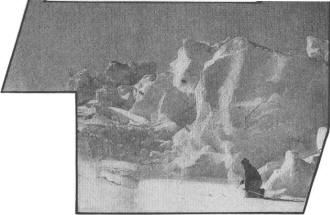 Approaching carefully the ragged rim of the crevasse we discovered
our sled lying, overturned, on a huge block of snow that had wedged itself about fifteen feet down.
Retrieving it was a ticklish job. We lowered Demas on a stout rope, and as he unloaded the sled we hauled
the material up, piece by piece, on hand lines. The knowledge that at any instant the snow block might
crumble and drop him into the fearsome darkness below lent a tension to this labor that stretched our
nerves to the breaking-point. Approaching carefully the ragged rim of the crevasse we discovered
our sled lying, overturned, on a huge block of snow that had wedged itself about fifteen feet down.
Retrieving it was a ticklish job. We lowered Demas on a stout rope, and as he unloaded the sled we hauled
the material up, piece by piece, on hand lines. The knowledge that at any instant the snow block might
crumble and drop him into the fearsome darkness below lent a tension to this labor that stretched our
nerves to the breaking-point.
Eight hours of back-straining work put us on the move again only to run into a howling blow that
forced us to camp for six hours. Pushing forward after the storm, by a lucky chance we hit the passage
through the pressure-ice. Clear of the pressure we built our first beacon. It looked a pitifully puny
thing in that black immensity, but in these miniature light-houses lay our only hope for steering the
tortuous course to Advance Base.
By the evening of the 5th we had made twenty miles. A rising wind whipping hard dry snow horizontally
in a milky mass reduced visibility to zero, so we laid up until noon of the 6th. We had made barely
three miles on the 6th when Demas reported that the tractor was not responding properly to the throttle.
With the thermometer at 58 degrees below zero, he made a hurried check-up and declared "The clutch is
worn out - we can't go on." It was more than exasperating. Hard as was the decision I had to order a
return to Little America, and leaving the loaded sleds cached beside the trail, we started nursing the
tractor back toward the base.
Our return trip was a sore trial. Continued low temperatures - 60 degrees below zero - caused ice
crystals to form in the gas line stalling the motor frequently; our fan belt parted and we repeatedly
fashioned sorry substitutes from alpine rope; the radiator boiled dry and we stopped every mile or so
to stuff it with snow; but we crawled into the base at 3 A.M. on the 7th, tired, hungry, dirty, cold
- and chagrined. The implacable Antarctic had beaten us again.
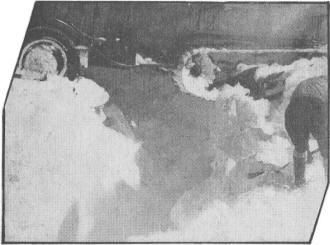 We found the camp in a state of suppressed tension. The suspicion
that had been slowly seeping through the base had crystallized into a conviction that the Admiral was
in peril. His halting messages, spelt out laboriously on a hand-cranked emergency radio-set in groups
of three or four words with a request to "wait" between each group, his uncertain sending, and his periods
of unexplained silence compelled the conclusion that he was having a difficult time. We expected no
direct confirmation of our suspicions because we knew that the rigid code of honor to which he adhered
would preclude his involving his men in any dangers that were not definitely a part of their duties.
A direct query "Are you hurt?" "Are you ill?" brought the response - after an over-long wait, "Please
don't ask me to crank any more. I'm O.K." We found the camp in a state of suppressed tension. The suspicion
that had been slowly seeping through the base had crystallized into a conviction that the Admiral was
in peril. His halting messages, spelt out laboriously on a hand-cranked emergency radio-set in groups
of three or four words with a request to "wait" between each group, his uncertain sending, and his periods
of unexplained silence compelled the conclusion that he was having a difficult time. We expected no
direct confirmation of our suspicions because we knew that the rigid code of honor to which he adhered
would preclude his involving his men in any dangers that were not definitely a part of their duties.
A direct query "Are you hurt?" "Are you ill?" brought the response - after an over-long wait, "Please
don't ask me to crank any more. I'm O.K."
He wasn't "O.K." - he couldn't be - but his steadfast refusal to worry us by any intimation that
all was not well revealed a consideration for us that affected us deeply. Whatever menace threatened
him, he chose to meet it alone and unaided - his inflexible code demanded this.
While Demas. Waite, and I snatched it few hours disturbed sleep, tractor No. 3 was tuned up, and
at 1:20 A.M. on August 8th, in a temperature of 44 degrees below zero, we set out again. By great good
fortune we struck the passage through the pressure-ice without loss of time. Clearing the pressure we
picked up the sleds that we had cached on the trail and had made thirty miles before decreasing visibility,
due to wind-borne snow, forced us to camp.
Moving forward again when visibility improved we were aided by the beacons which we built, as we
went along and by the approach of the annual dawn which now afforded an hour or so of smeary twilight
,at noon each day. By the evening of the 9th we fetched lip at the 50-mile point. Reaching the northern
edge of the Valley of Crevasses we altered our course to swing around it. If we could .gain the other
side the most baffling part of the journey would be behind us. Cautiously, laying our route by the microscopic
light of the beacons, we hitched along on the detour.
Lowering temperatures and furious winds plagued us and the physical strain began taking toll of our
endurance. We had been hammering ahead continuously for more than twenty-six hours since we had last
camped at the thirty-mile point, but there was no lime to rest for we were making good progress and
felt it necessary to keep going as long as we could stand it.
By 7:45 on the morning of the 10th we had worked around the Valley of Crevasses and picked up signs
of the old trail that had been broken in March. Despite our exhaustion we were elated as we anticipated
easier going from there on. But misfortune was in the offing. The generator on the tractor began to
go bad and the ignition became erratic. Soon the generator gave up the ghost entirely, and in the feeble
rays of flashlights we replaced it with a spare that we carried. Bitter work, this. At 3:45 on the afternoon
of the 10th we were at 81 miles with about 50 miles to go to reach our objective.
Again generator trouble assailed us. The brushes on the spare wore down rapidly under the punishing
going and we had to whittle small blocks of wood to wedge them to a contact. The exposure of hands and
faces entailed in this job was plain torture. After each halt to repair the generator we would climb
wearily back to our respective places - Demas at the wheel, Waite at the radio, and I on top of the
cab where I could throw the rays of the search-light on our path - and grind on again .
About 10 P.M. on the 11th I was startled by the sudden appearance of a bright bluish glare on the
horizon dead ahead. It was unmistakably a magnesium flare. We had made good time since the early afternoon
and if my calculations were correct we were nearing the region in which Advance Base was located. Demas
and Waite had also seen the glow and pounded frantically on the roof of the cab. It could have but one
meaning - there was only one human being in all the sweep of the Antarctic continent south of Little
America, Admiral Byrd. In my excitement I loosed my hold on the search-light and was almost lost overboard
as the tractor jerked forward when Demas impulsively gave it the gas.
Just before midnight, as we topped a slight rise, the beam of the search-light picked out a fur-clad
figure walking somewhat unsteadily toward us. "Hello, fellows" it said, "come below, I have some hot
soup for you."
As, later, we looked at Admiral Byrd in the close confines of his 9 x 13 foot shack under the snow,
and noted the ghastly wasting of his sturdy body, the gray pallor of his tightly-drawn skin, and the
weak hollowness of a voice that seemed to come from somewhere outside his body, we were appalled. A
great pity, that brought moisture to our eyes, welled up in us as we mentally cataloged the marks of
some monstrous torturing ordeal that had scarred him; but he told us nothing that would satisfy our
burning curiosity, instead he treated the situation as unconcernedly as though we were daily visitors.
His chief anxiety was for us.
It was months after we had returned to Little America that we learned, little by little from various
sources, something of the mighty trial of flesh and spirit that had so nearly cost him his life. Stricken
down on May 28th by poisonous fumes from a tiny engine that powered his radio set and a faulty oil stove,
for more than three months the Admiral utterly alone, had waged a grim fight against desperate illness
and the pitiless cold of Antarctica, Almost insurmountable odds.
As gradually we added to our scanty knowledge of his incredible experience, we at length realized
that through months of excruciating suffering and though daily facing death, he had deliberately chosen
to die rather than send out an "S.O.S." that might have endangered the lives of those of us who would
have gladly responded to his call. Such is the stature of .the man whom we were all proud to term leader
- and comrade.
The return trip to Little America which we delayed until October as the Admiral was too weak to be
moved before then was made without mishap. We had, aside from the boon of comparatively moderate weather,
the advantage of full daylight and the marked trail which we had cut on the outward journey.
Admiral Byrd himself in his recently published book Alone (Putnam $2.50) tells the amazing story
of his experience at Advance Base; a thrilling story of an adventure in solitude under conditions that
those who have never known the hideous cold, the labor that mere existence without any real comfort
entails or the horror of excruciating suffering without anyone to give companionship or care, can scarcely
comprehend. And this despite the vivid way in which the explorer describes his ordeal.
Posted July 8, 2014
|


